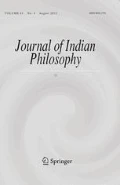Conclusions
The section we have examined is a persuasive and sustained demolition of the realist strategy of deriving an invariable concomitance between the existenthood of the world and the system of validation (a system accepted by both parties as being the regulator of epistemic activity). This leaves the Advaitin with an absence of invariable concomitance. This is where the Advaitin wants to be. On his view, the absence of this concomitant dependence of the system of validation on an ‘existent’ world points to the possibility that the cognized world is not that independent world which Nyāya takes to be the determinate reality. If that world is not philosophically proven to be so independent, then there is at least aprima facie case for the Advaitic soteriological claim that it is Brahman alone which is ultimately real, even though the commonly cognized world allows of coherent epistemic activity. It is fair to say that such a view is established by the failure of the opponent to prove invariable concomitance between inquiry, validation and an independent world. It is the inability of the opposing view to prove a metaphysical claim which itself points to the nature of the Advaitic position; the position, that is, which suspends the need to make an ontic commitment to the extrinsic world as a determinate reality. Whether the critique of the Nyāya concept ofsattā takes us to the refutation of the Nyāya concept of a determinate world (and whether the Advaitic rejection ofsattā is of a piece with the concept of an ‘indeterminate’ world) is another issue, dealt with in detail by Śrī Har\(\underset{\raise0.3em\hbox{$\smash{\scriptscriptstyle\cdot}$}}{s} \)a elsewhere in his book, but beyond the purview of this paper.
Similar content being viewed by others
Bibliography
Akśapāda Gautama:Nyāyasūtra. Edited with Vātsyāyana's Nyāyabhā\(\underset{\raise0.3em\hbox{$\smash{\scriptscriptstyle\cdot}$}}{s} \)ya, Uddyotakara'sNyāyavārttika, Vācaspati's Tātparya\(\underset{\raise0.3em\hbox{$\smash{\scriptscriptstyle\cdot}$}}{t} \)īkā, and Udayana'sPariśuddhi by A. Thakur. Mithila, 1967.
Al-George (1971). Lak\(\underset{\raise0.3em\hbox{$\smash{\scriptscriptstyle\cdot}$}}{s} \)a\(\underset{\raise0.3em\hbox{$\smash{\scriptscriptstyle\cdot}$}}{n} \) inFestschrift for K. C. Chattopadhyaya.
Baker, G. P. and Hacker, P. M. S. (1984).Language, Sense and Nonsense. Oxford: Blackwell.
Baker, G. P. and Hacker, P. M. S. (1984a).Scepticism, Rules and Language. Oxford: Blackwell.
Descartes, René:The Philosophical Works of Descartes. Edited and translated by E. S. Haldane and G. R. T. Ross. New York: Dover, 1955.
Dharmarājadvārīndra: Vedāntaparibhā\(\underset{\raise0.3em\hbox{$\smash{\scriptscriptstyle\cdot}$}}{n} \)ā. Edited by S. Suryanarayana Sastri. Madras: Adyar, 1942.
Granoff, Phyllis (1978).Philosophy and Argument in Late Vedānta. Dordrecht: Reidel.
Hacker, P. M. S. (1986).Insight and Illusion. Oxford: Clarendon.
Hudson, W. Donald (1975).Wittgenstein and Religious Belief. London: Macmillan.
Hume, David:A Treatise of Human Nature. Edited by L. A. Selby-Bigge. Oxford: Clarendon: 1888, 1968.
Ingalls, D. H. H. (1952).Materials for the Study of Navya-Nyāya Logic. Harvard Oriental Series. Cambridge: Harvard University Press.
Kripke, Saul (1982).Wittgenstein, Rules and Private Language: An Elementary Exposition. Oxford: Blackwell.
Matilal, B. K. (1968).Navya-Nyāya Doctrine of Negation. Harvard Oriental Series. Cambridge: Harvard University Press.
Matilal, B. K. (1986).Perception. Oxford: Clarendon Press.
Potter, K. H. (1957). Translation of and Commentary on Raghunātha's Padārthatattvanirūpa\(\underset{\raise0.3em\hbox{$\smash{\scriptscriptstyle\cdot}$}}{n} \)a. Cambridge: Harvard-Yenching.
Prabhākara: B\(\underset{\raise0.3em\hbox{$\smash{\scriptscriptstyle\cdot}$}}{r} \)hatī. Edited with Śalikanātha's commentary by Chinnaswami Shastri. Benares: Chowkambha Sanskrit Series, 1929–33.
Quine, W. von O. (1952).Methods of Logic. London: Routledge and Kegan Paul.
Raghunātha: Padārthatattvanirūpa\(\underset{\raise0.3em\hbox{$\smash{\scriptscriptstyle\cdot}$}}{n} \)a. Edited with the commentaries of Raghudeva and Rāmabhadra by Vindheswariprasad Dvivedi}. Benares: E. J. Lazarus Co., 1916.
Rām-Prasad, C. (forthcoming). ‘A Śa\(\dot n\)karite Critique of Vijñānavāda’.Philosophy East and West, 1993.
Śa\(\dot n\)kara: Bmhmasūtrabhā\(\underset{\raise0.3em\hbox{$\smash{\scriptscriptstyle\cdot}$}}{s} \)ya. Edited by Pandit Dandiraj Sastri. Benares: Kashi Sanskrit Series, 1929.
Śrī Har\(\underset{\raise0.3em\hbox{$\smash{\scriptscriptstyle\cdot}$}}{s} \)a: Kha\(\underset{\raise0.3em\hbox{$\smash{\scriptscriptstyle\cdot}$}}{n} \underset{\raise0.3em\hbox{$\smash{\scriptscriptstyle\cdot}$}}{d} \)anakha\(\underset{\raise0.3em\hbox{$\smash{\scriptscriptstyle\cdot}$}}{n} \underset{\raise0.3em\hbox{$\smash{\scriptscriptstyle\cdot}$}}{d} \)akhādya. Edited with Śa\(\underset{\raise0.3em\hbox{$\smash{\scriptscriptstyle\cdot}$}}{m} \)kara Miśra's commentary by Navikanta Jha. Benares: Kashi Sanskrit Series, 1970.
Śri Har\(\underset{\raise0.3em\hbox{$\smash{\scriptscriptstyle\cdot}$}}{s} \)a. Benares: Achyut Grantamala, 1969.
Strawson, P. F. (1952).Introduction to Logical Theory. London: Methuen.
Strawson, P. F. (1985).Scepticism and Naturalism: Some Varieties. London: Methuen.
Udayana:Nyāyakusumáñjali. Edited with various commentaries by Padmaprasadopadhyaya. Benares: Kashi Sanskrit Series, 1950.
Vācaspati Miśra:Bhāmati. Edited by N. A. Krishna Sastri and V. L. Shastri Pansikar. Bombay: Nirnayasagar, 1917.
Vācaspati Miśra: Nyāyabhā\(\underset{\raise0.3em\hbox{$\smash{\scriptscriptstyle\cdot}$}}{s} \)yavārttikatātparya\(\underset{\raise0.3em\hbox{$\smash{\scriptscriptstyle\cdot}$}}{t} \)īkā. Edited by R. S. Dravid. Benares: Kashi Sanskrit Series, 1925.
Vaidevasūri:Syādvādaratnākarā. Edited by Motilal Ladhaji. VolumeII. Poona: Arhatamataprabhakara, 1930.
Vātsyāyana,see Akśapāda Gautama.
Walker, R. C. S. (1989).The Coherence Theory of Truth. London: Routledge.
Wittgenstein, L.:Tractatus Logico-Philosophicus. Translated by D. F. Pears and B. F. McGuiness. London: Routledge and Kegan Paul, 1961.
Wittgenstein, L.:Philosophical Investigations. In German and English. Oxford: Blackwell, 1953.
Author information
Authors and Affiliations
Rights and permissions
About this article
Cite this article
Ram-Prasad, C. Knowledge and the ‘real’ world: Śrī Har\(\underset{\raise0.3em\hbox{$\smash{\scriptscriptstyle\cdot}$}}{s} \)a and thePramā \(\underset{\raise0.3em\hbox{$\smash{\scriptscriptstyle\cdot}$}}{n} \) as . J Indian Philos 21, 169–203 (1993). https://doi.org/10.1007/BF01682177
Issue Date:
DOI: https://doi.org/10.1007/BF01682177



